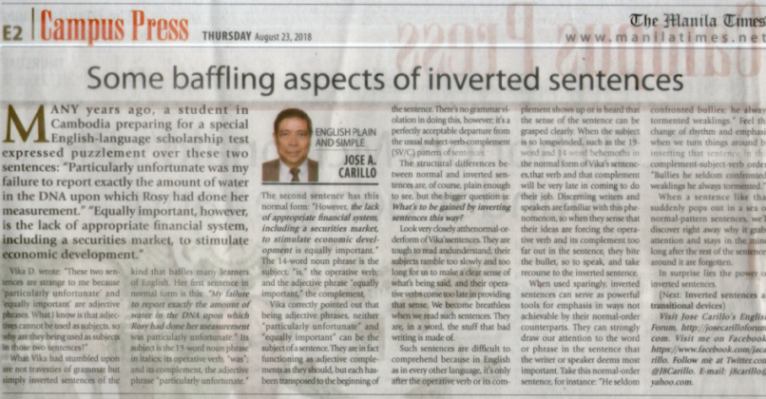Many years ago, a student in Cambodia preparing for a special English-language scholarship test expressed puzzlement over these two sentences: “Particularly unfortunate was my failure to report exactly the amount of water in the DNA upon which Rosy had done her measurement.” “Equally important, however, is the lack of appropriate financial system, including a securities market, to stimulate economic development.”
Vika D. wrote: “These two sentences are strange to me because ‘particularly unfortunate’ and ‘equally important’ are adjective phrases. What I know is that adjectives cannot be used as subjects, so why are they being used as subjects in those two sentences?”
IMAGE CREDIT: HEATHER BAKER, PROWRITINGAID.COM*In attention-grabbing and surprise lies the power of inverted sentences
What Vika had stumbled upon are actually not travesties of grammar but simply inverted sentences of the kind that baffles many learners of English. Her first sentence in normal form is this: “
My failure to report exactly the amount of water in the DNA upon which Rosy had done her measurement was particularly unfortunate.” Its subject is the 19-word noun phrase in italics; its operative verb, “was”; and its complement, the adjective phrase “particularly unfortunate.” The second sentence has this normal form: “
However, the lack of appropriate financial system, including a securities market, to stimulate economic development is equally important.” The 14-word noun phrase is the subject; “is,” the operative verb; and the adjective phrase “equally important,” the complement.
Vika correctly pointed out that being adjective phrases, neither “particularly unfortunate” and “equally important” can be the subject of a sentence. They are in fact functioning as adjective complements as they should, but each has been transposed to the beginning of the sentence. There’s no grammar violation in doing this, however; it’s a perfectly acceptable departure from the usual subject-verb-complement (SV/C) pattern of sentences.
The structural differences between normal and inverted sentences are, of course, plain enough to see, but the bigger question is:
What’s to be gained by inverting sentences that way? Again, look very closely at the normal-order form of Vika’s sentences:
“My failure to report exactly the amount of water in the DNA upon which Rosy had done her measurement was particularly unfortunate.”
“However, the lack of appropriate financial system, including a securities market, to stimulate economic development is equally important.”
They are tough to read and understand; their subjects ramble too slowly and too long for us to make a clear sense of what’s being said, and their operative verbs come too late in providing that sense. We become breathless when we read such sentences. They are, in a word, the stuff that bad writing is made of.
Such sentences are difficult to comprehend because in English as in every other language, it’s only after the operative verb or its complement shows up or is heard that the sense of the sentence can be grasped clearly. When the subject is so longwinded, such as the 19-word and 14-word behemoths in the normal form of Vika’s sentences, that verb and that complement will be very late in coming to do their job. Discerning writers and speakers are familiar with this phenomenon, so when they sense that their ideas are forcing the operative verb and its complement too far out in the sentence, they bite the bullet, so to speak, and take recourse to the inverted sentence.
When used sparingly, inverted sentences can serve as powerful tools for emphasis in ways not achievable by their normal-order counterparts. They can strongly draw our attention to the word or phrase in the sentence that the writer or speaker deems most important. Take this normal-order sentence, for instance: “He seldom confronted bullies; he always tormented weaklings.” Feel the change of rhythm and emphasis when we turn things around by inverting that sentence in this complement-subject-verb order: “Bullies he seldom confronted; weaklings he always tormented.”
When a sentence like that suddenly pops out in a sea of normal-pattern sentences, we’ll discover right away why it grabs attention and stays in the mind long after the rest of the sentences around it are forgotten.
In surprise lies the power of inverted sentences.
 This essay, 1106th of the series, appeared in the column “English Plain and Simple” by Jose A. Carillo in the Campus Press section of the August 23, 2018 issue (print edition only) of
This essay, 1106th of the series, appeared in the column “English Plain and Simple” by Jose A. Carillo in the Campus Press section of the August 23, 2018 issue (print edition only) of The Manila Times
, © 2018 by the Manila Times Publishing Corp. All rights reserved.--------
 *Above is the lovely uninverted photo that I took the liberty of using to come up with the visual for this article. It is from the ProWritingAid website featuring Heather Baker’s blog “Writing for a British Audience,” November 16, 2016). (Thank you so much, Heather!) The article about the differences between British English and American English is very informative and interesting, by the way, so I invite Forum members to check it out.
*Above is the lovely uninverted photo that I took the liberty of using to come up with the visual for this article. It is from the ProWritingAid website featuring Heather Baker’s blog “Writing for a British Audience,” November 16, 2016). (Thank you so much, Heather!) The article about the differences between British English and American English is very informative and interesting, by the way, so I invite Forum members to check it out.(Next:
Inverted sentences as transitional devices) August 30, 2018